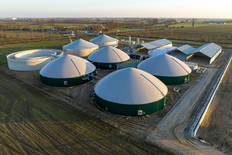- Verdalia Bioenergy plans to invest over €1 billion by 2026 in biomethane plants across Europe.
- The acquired portfolio in Italy has a combined production capacity of 190 GWh from 350,000 tonnes of raw materials annually.
- The acquisition helps avoid approximately 65,000 tonnes of greenhouse gas emissions per year.
- Verdalia's team has grown to 50 people with a development pipeline exceeding 2.5 TWh in Spain and Italy.

Acquisition Details
Verdalia Bioenergy, founded by Goldman Sachs Asset Management, Fernando Bergasa, and Cristina Ávila, is set to acquire seven biomethane plants in Italy from Green Arrow Capital and Lazzari & Lucchini. The acquisition is subject to standard conditions for such transactions.
Production Capacity
The portfolio includes plants located in Brescia, with a combined production capacity of 190 GWh of biomethane per year, derived from processing 350,000 tonnes of raw materials annually. The plants, operational for the past four years, process animal residues and agricultural by-products, reducing greenhouse gas emissions by approximately 65,000 tonnes annually.
Company Background
Verdalia Bioenergy was launched in February 2023 with the aim of investing over €1 billion by 2026 to develop, acquire, and operate biomethane plants across Europe. In March 2023, Verdalia acquired a portfolio of biomethane projects in Spain with a total capacity of around 150 GWh/year. The company has a team of 50 people and a development pipeline exceeding 2.5 TWh in Spain and Italy.
Future Plans
The acquisition strengthens Verdalia’s presence in Europe, positioning it as a leading biomethane player. Verdalia plans to expand the portfolio’s production capacity and monetize by-products like bio-fertilizer and biogenic CO2. The company continues to seek new opportunities, including acquiring operational and development projects, establishing partnerships with EPCs, and securing long-term agreements with offtakers and feedstock providers.
Environmental Impact
Biomethane, also known as renewable natural gas (RNG), is produced through the anaerobic digestion of organic waste. It offers the benefits of fossil natural gas without the associated carbon emissions, leveraging existing gas infrastructure and preventing methane emissions from organic waste decomposition.

